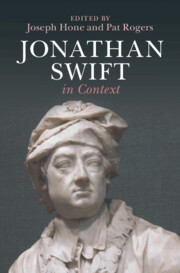Book contents
- Jonathan Swift in Context
- Jonathan Swift in Context
- Copyright page
- Contents
- Notes on Contributors
- Preface
- Acknowledgements
- Chronology
- Abbreviations
- Part I Personal
- Part II Publishing History and Legacy
- Part III Literary Background
- Part IV Genres
- Part V The External World
- Chapter 25 Literary Scene
- Chapter 26 Party Politics
- Chapter 27 Clubs
- Chapter 28 Walpole and the Opposition
- Chapter 29 The Church of England
- Chapter 30 Dissent
- Chapter 31 London
- Chapter 32 Literary Scene
- Chapter 33 The Church of Ireland
- Chapter 34 Dublin
- Part VI Social and Intellectual Topics
- Further Reading
- Index
Chapter 30 - Dissent
from Part V - The External World
Published online by Cambridge University Press: 02 May 2024
- Jonathan Swift in Context
- Jonathan Swift in Context
- Copyright page
- Contents
- Notes on Contributors
- Preface
- Acknowledgements
- Chronology
- Abbreviations
- Part I Personal
- Part II Publishing History and Legacy
- Part III Literary Background
- Part IV Genres
- Part V The External World
- Chapter 25 Literary Scene
- Chapter 26 Party Politics
- Chapter 27 Clubs
- Chapter 28 Walpole and the Opposition
- Chapter 29 The Church of England
- Chapter 30 Dissent
- Chapter 31 London
- Chapter 32 Literary Scene
- Chapter 33 The Church of Ireland
- Chapter 34 Dublin
- Part VI Social and Intellectual Topics
- Further Reading
- Index
Summary
Swift hated religious dissenters. This chapter explores how Swift expressed that hatred. The first section introduces who Swift meant by dissenters and the essential contexts for understanding their position in the early eighteenth-century social order. The second section demonstrates the degree to which Swift’s hatred of dissent and religious enthusiasm imbues A Tale of a Tub. The chapter argues that the Tale left itself open to accusations of impiety and irreligion by refusing to offer a norm within the text by which religious heterodoxy could be judged. Swift’s characteristic impulse to invade the design of other literary forms and subvert their premises led him not only to anatomise sectarian folly but to parody the voices of anti-sectarian literature.
Keywords
- Type
- Chapter
- Information
- Jonathan Swift in Context , pp. 240 - 247Publisher: Cambridge University PressPrint publication year: 2024

